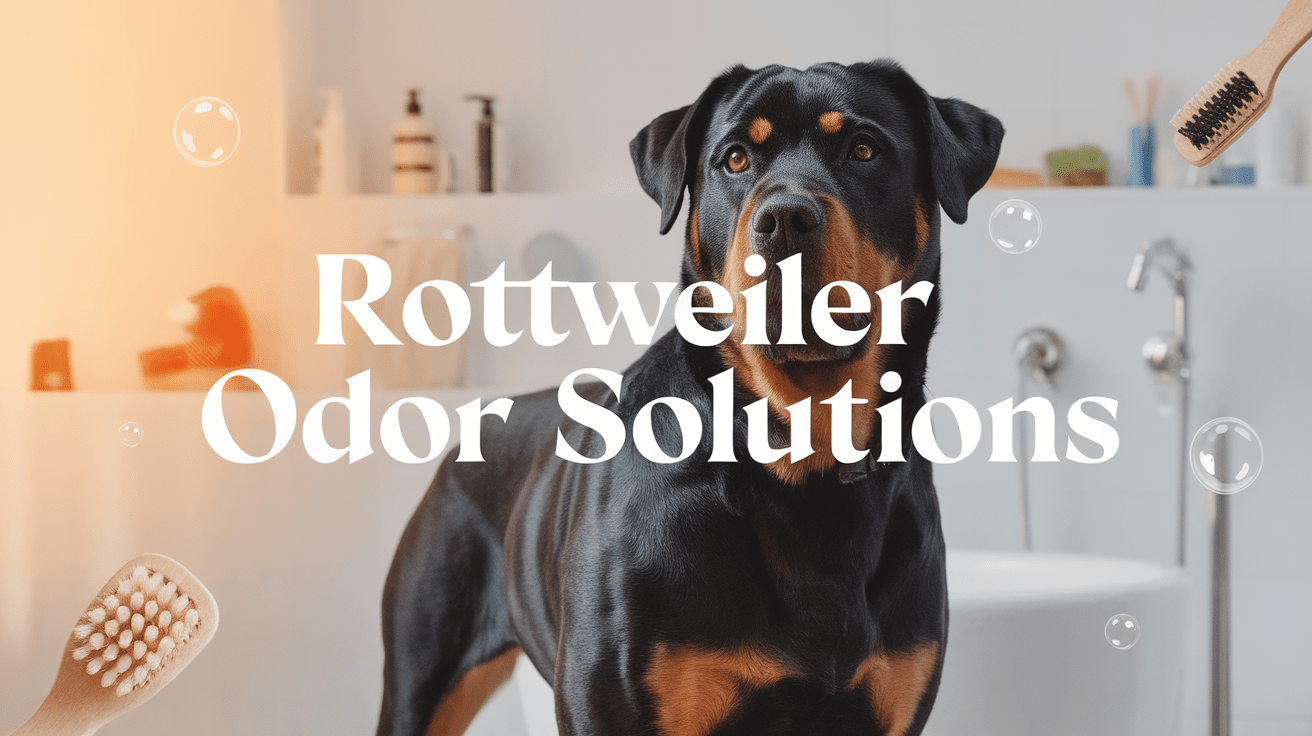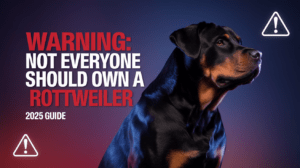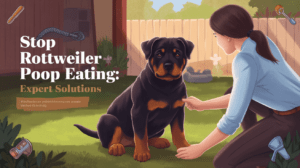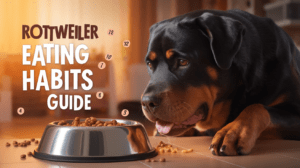Why Does My Rottweiler Stink? Key Takeaways
- ✓ Regular Grooming: Brush your Rottweiler 2-3 times weekly and bathe every 6-8 weeks to prevent odor-causing bacteria buildup in their dense coat.
- ✓ Health Monitoring: Different types of odors can indicate specific health issues – yeasty smells might suggest infections, while fishy odors could mean anal gland problems.
- ✓ Diet Importance: High-quality food and proper nutrition can significantly reduce body odor and prevent digestive issues that cause unpleasant smells.
- ✓ Veterinary Care: Regular check-ups and prompt attention to unusual odors can prevent minor issues from becoming major health problems.
- ✓ Environmental Factors: Clean bedding, proper ventilation, and monitoring outdoor activities help maintain a fresh-smelling Rottweiler.
Is your Rottweiler’s odor making you wrinkle your nose? You’re not alone! According to the American Veterinary Medical Association, over 38% of dog owners report dealing with pet odor issues. As a veterinarian and Rottweiler owner for over 15 years, I’ve encountered my fair share of smelly situations with these lovable giants.
While Rottweilers aren’t naturally stinkier than other breeds, their dense double coat and active lifestyle can make them prone to developing various odors. The good news? Most unpleasant smells have straightforward solutions. Whether it’s that classic wet dog smell or something more concerning, understanding the root cause is key to keeping your Rottie fresh and healthy.
In this comprehensive guide, we’ll explore the common causes of Rottweiler odors and provide practical solutions to help your four-legged friend smell as good as they look. From basic grooming tips to identifying potentially serious health issues, you’ll learn everything you need to know about tackling those pesky pet odors.
To maintain proper hygiene and prevent odors, check out our detailed product recommendations in Best Dog Shampoos for Rottweilers: Top 4 Picks [2025 Guide] for choosing the right grooming products.
Common Reasons Behind Your Rottweiler’s Bad Smell
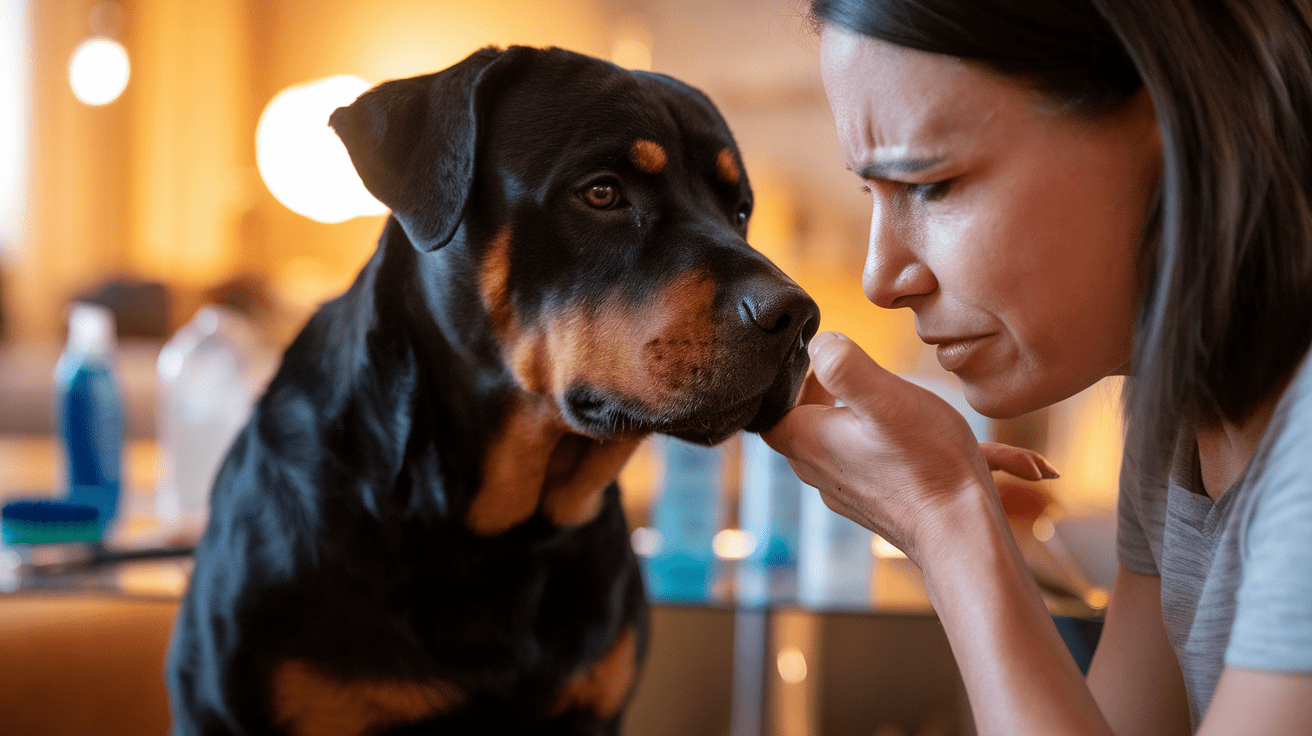
As a veterinarian who’s treated countless Rottweilers, I’ve discovered that pinpointing the source of your dog’s odor is like solving a puzzle. According to a Merck Veterinary Manual study, nearly 20% of dogs suffer from skin conditions that can cause unusual odors. Let me share what I’ve learned about the most common culprits behind your Rottweiler’s unpleasant smell.
Poor Grooming and Hygiene Habits
Think of your Rottweiler’s coat like a sponge – it absorbs everything from dirt to bacteria. Their dense double coat can trap moisture and debris, creating the perfect environment for odor-causing bacteria. I learned this firsthand when my Rottie Max developed a peculiar smell after skipping his regular grooming routine during a busy week. Regular brushing and proper bathing schedules are crucial for preventing these issues.
Skin Infections and Medical Conditions
Sometimes that funky smell isn’t just about cleanliness. Bacterial and yeast infections are common in Rottweilers, especially in their skin folds and between their toes. These conditions often produce distinct odors and require medical attention. If you notice your dog constantly scratching or licking certain areas, it’s time for a vet visit.
Dental Problems and Bad Breath
Bad breath isn’t just unpleasant – it’s often a warning sign. Dental disease affects about 80% of dogs over age three, and Rottweilers are no exception. That morning “doggy kiss” shouldn’t make you recoil! Regular dental care is essential for both health and fresh breath.
Diet-Related Odors
Your Rottweiler’s diet plays a significant role in their overall smell. Low-quality foods can lead to digestive issues and skin problems, resulting in various odors. I’ve seen remarkable improvements in dogs’ smell just by switching to a high-quality, balanced diet.
Environmental Factors
Environmental elements like swimming in stagnant water or rolling in something smelly (we’ve all been there!) can cause temporary odors. While these are usually easy to fix with a bath, consistent exposure to certain environments might require more frequent grooming sessions.
Understanding these common causes helps target the right solution for your Rottweiler’s specific odor issue. Remember, a persistent or unusual smell might indicate an underlying health problem, so don’t hesitate to consult your veterinarian if you’re concerned.
Identifying Different Types of Rottweiler Odors
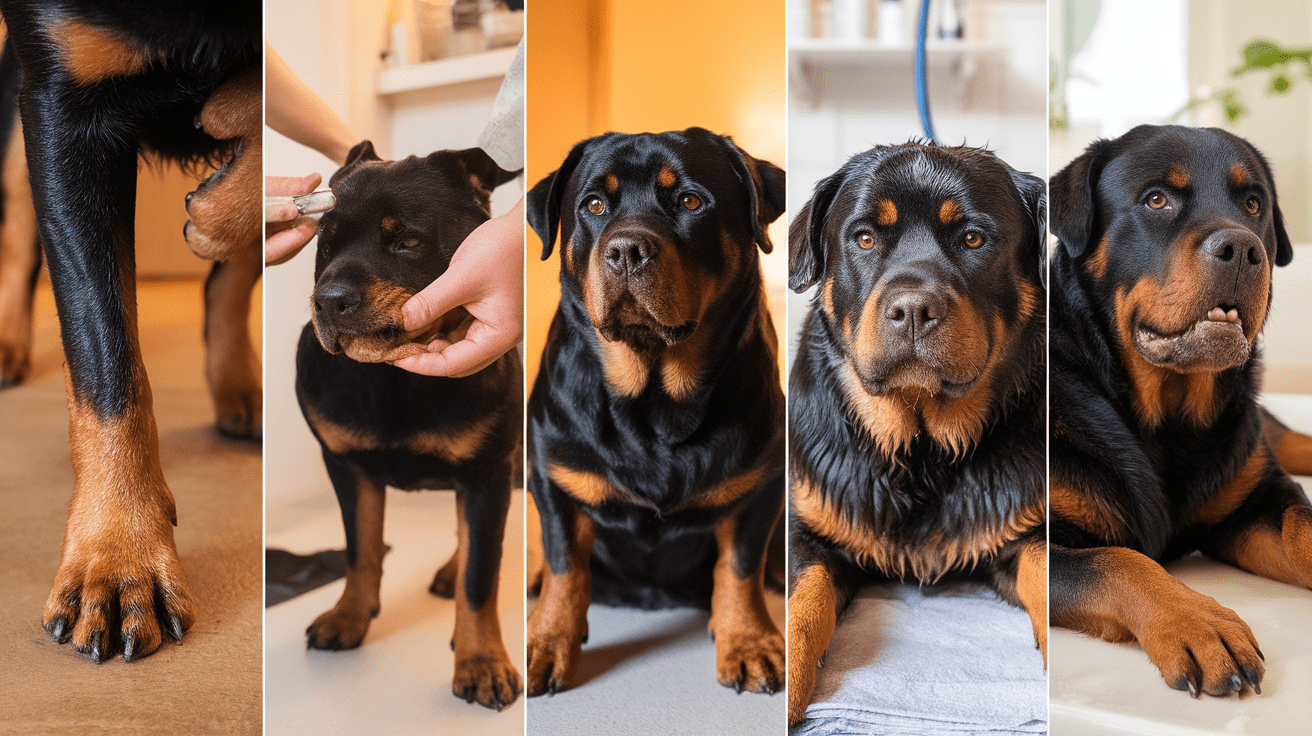
During my veterinary practice, I’ve noticed that different odors often indicate specific issues. According to a American Animal Hospital Association study, approximately 25% of veterinary visits are related to skin conditions, many of which produce distinctive smells. Let’s break down these different odors and what they might mean for your Rottweiler.
Yeasty or Musty Smell
If your Rottie smells like bread dough or corn chips (yes, really!), you’re likely dealing with a yeast infection. I remember treating a Rottweiler named Bear who had this distinct smell coming from his paws. His owner thought it was normal until we discovered a significant yeast overgrowth. This smell is particularly common between toe pads and in skin folds.
Fishy or Foul Odors
A fishy smell often indicates anal gland issues – a common problem I see in Rottweilers. This distinctive odor might appear suddenly, especially after your dog has been sitting. Sometimes, it’s accompanied by your dog scooting across the floor. Don’t ignore these signs, as they usually require professional attention.
Wet Dog Smell
That classic wet dog odor isn’t just about being wet – it’s about bacteria and yeasts becoming more active in moist conditions. Your Rottweiler’s thick double coat can trap moisture, making this smell more intense. Think of it like a damp towel left in a humid room – the longer it stays wet, the stronger the smell becomes.
Sweet or Pungent Body Odor
A sweet or pungent smell, particularly if it’s new or unusual, could indicate skin infections or hormonal issues. In my experience, diabetes can sometimes cause a sweet, fruity breath odor. Any sudden changes in your dog’s natural scent warrant a veterinary check-up.
Gas and Digestive Issues
Excessive gas isn’t just unpleasant – it could signal dietary problems or digestive issues. I’ve helped many Rottweiler owners solve this problem by identifying food sensitivities or inappropriate diets. Sometimes, it’s as simple as switching to a more digestible food formula or addressing underlying gastrointestinal issues.
Understanding these different odors helps you become more attuned to your Rottweiler’s health. While some smells are normal, others might be your first clue to potential health issues. When in doubt, it’s always better to consult with your veterinarian rather than dismiss an unusual odor.
Effective Solutions to Eliminate Your Rottweiler’s Smell
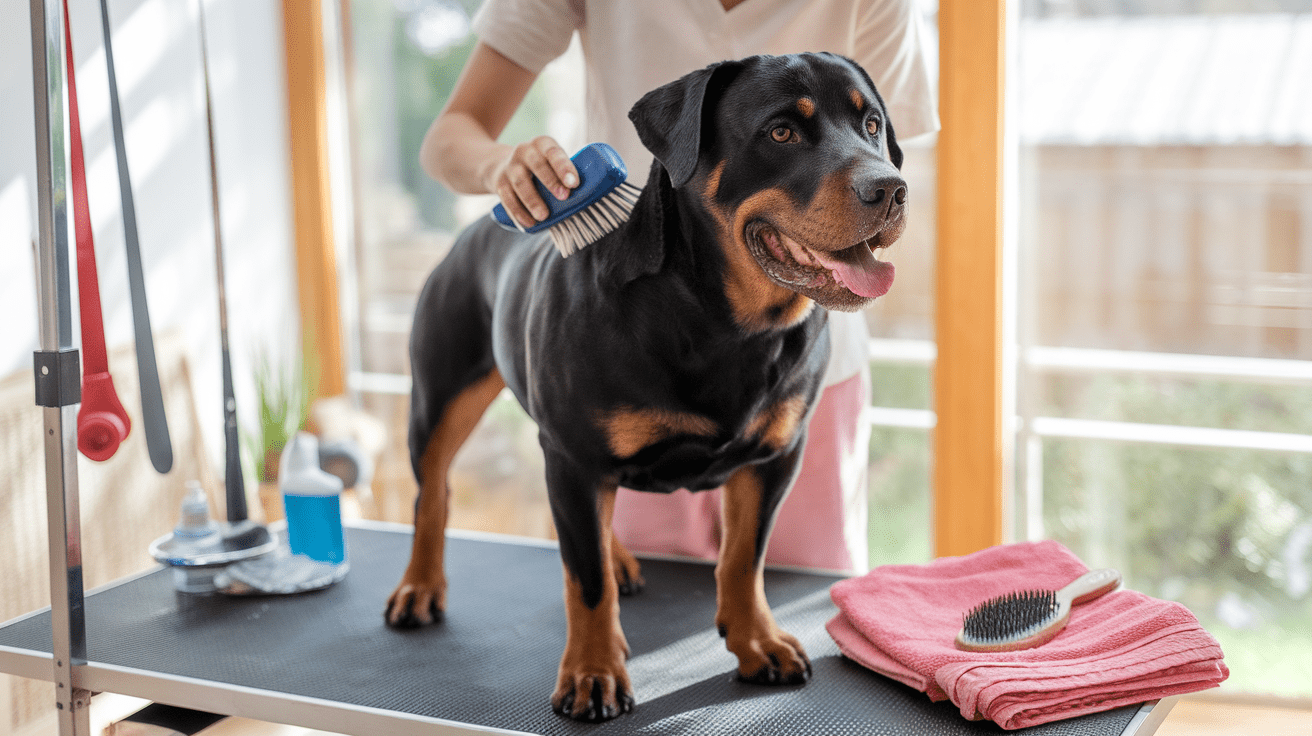
After years of treating Rottweilers and owning several myself, I’ve developed effective strategies for tackling those persistent odor issues. According to the PDSA Pet Health Hub, regular grooming alone can prevent up to 70% of common skin problems that cause bad odors. Let me share some proven solutions that have worked for countless Rottweilers in my practice.
Proper Grooming Techniques
Establishing a solid grooming routine is your first line of defense against odors. I learned this lesson with my first Rottweiler, Duke, who transformed from a smelly pup to a fresh-smelling companion with proper grooming. Here’s what works:
• Brush your Rottie 2-3 times weekly to remove dead hair and distribute natural oils
• Bathe every 6-8 weeks with dog-specific shampoo
• Pay special attention to skin folds and between toes
• Always dry thoroughly after baths or swimming
Medical Treatments and Veterinary Care
Sometimes, professional intervention is necessary. When my client’s Rottweiler developed a persistent yeasty smell, we discovered an underlying skin condition that required medicated shampoo and oral antibiotics. Don’t hesitate to seek veterinary care for:
• Persistent skin infections requiring prescription medications
• Professional dental cleaning and care
• Anal gland expression when needed
• Regular health check-ups to catch issues early
Dietary Adjustments
Think of your Rottweiler’s diet as the foundation of their health. I’ve seen remarkable improvements in body odor just by making smart dietary changes:
• Choose high-quality, easily digestible protein sources
• Consider adding probiotics for digestive health
• Monitor for food sensitivities that might cause skin issues
• Ensure adequate water intake to maintain healthy skin
Environmental Management
Your Rottie’s environment plays a crucial role in their odor profile. One of my patients stopped developing frequent hot spots and associated odors after their owner addressed the humidity in their home. Consider:
• Regular washing of bedding and toys
• Proper ventilation in sleeping areas
• Cleaning and disinfecting food and water bowls
• Monitoring outdoor activities that might lead to odors
Preventive Care Measures
Prevention is always better than cure. Implementing these preventive measures can keep your Rottweiler smelling fresh:
• Schedule regular veterinary check-ups
• Maintain a consistent grooming schedule
• Keep a log of any unusual odors or changes
• Address minor issues before they become major problems
Remember, eliminating your Rottweiler’s odor isn’t just about masking smells – it’s about addressing the root causes. Through proper care and attention, you can maintain a fresh-smelling, healthy companion. If you’re ever unsure about an odor or its cause, don’t hesitate to consult with your veterinarian.
Frequently Asked Questions About Rottweiler Odor
Final Thoughts on Managing Your Rottweiler’s Odor
Managing your Rottweiler’s smell is about finding the right balance between preventive care and prompt attention to emerging issues. Remember that occasional odors are normal, but persistent or unusual smells often signal that something needs attention. Through my years of veterinary practice, I’ve learned that successful odor management comes down to three key factors: consistent grooming, proper nutrition, and regular veterinary check-ups. Don’t let unpleasant odors affect the special bond you share with your Rottweiler. With the right approach and attention to detail, you can keep your four-legged friend fresh and healthy. If you’re ever in doubt about a particular smell or condition, trust your instincts and consult with your veterinarian – they’re your best partner in maintaining your Rottweiler’s health and hygiene.
While addressing odor issues is important, it’s crucial to understand your Rottweiler’s overall health needs. For a comprehensive overview of potential health concerns and preventative measures, check out our detailed Rottweiler Health 101 Guide. This resource covers everything from common genetic conditions to essential preventative care practices, helping you maintain your Rottie’s optimal health beyond just keeping them smelling fresh.


